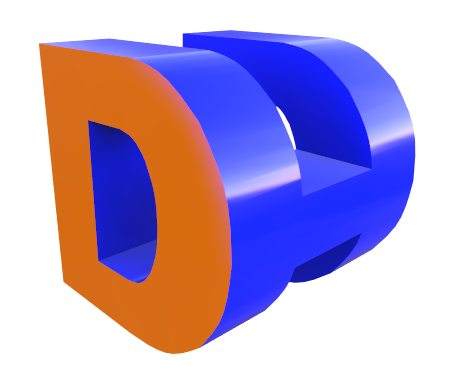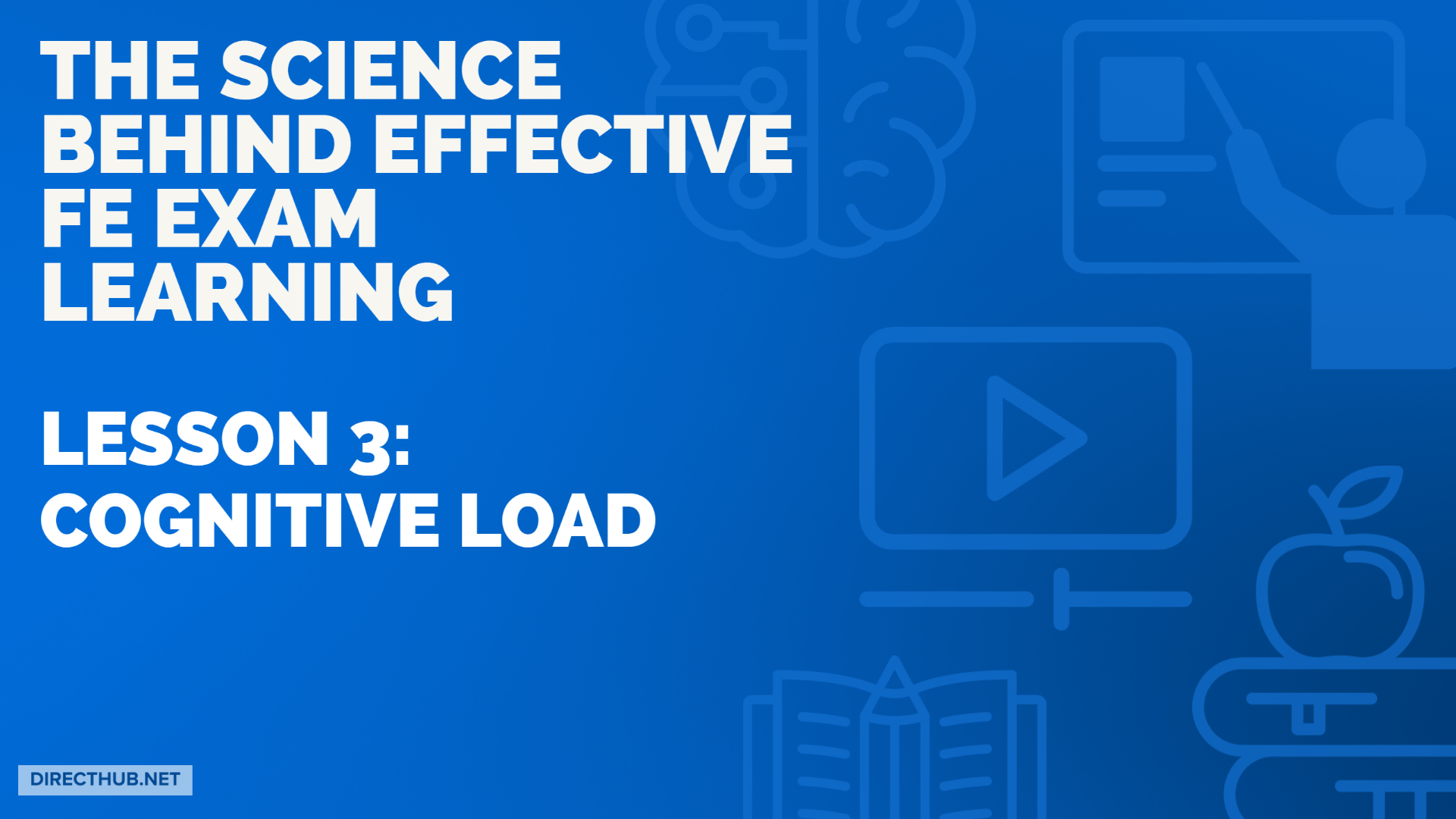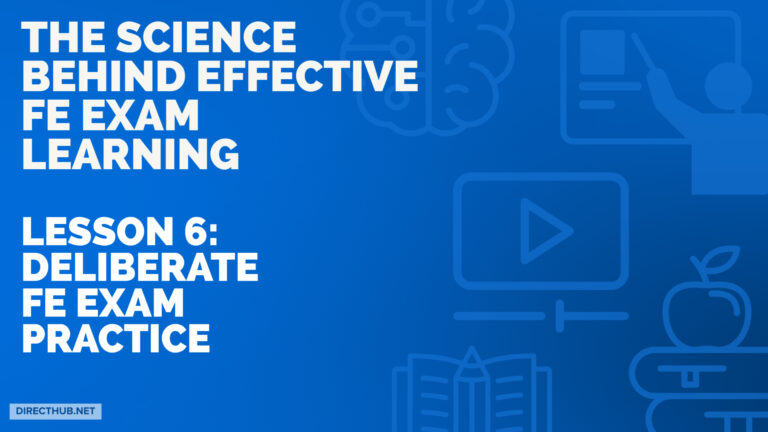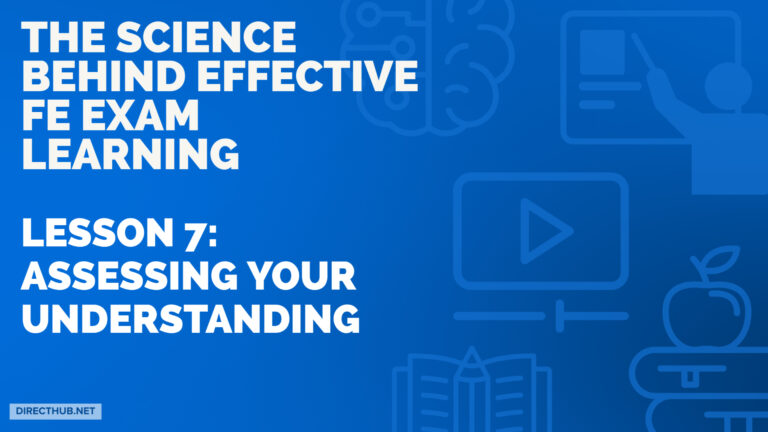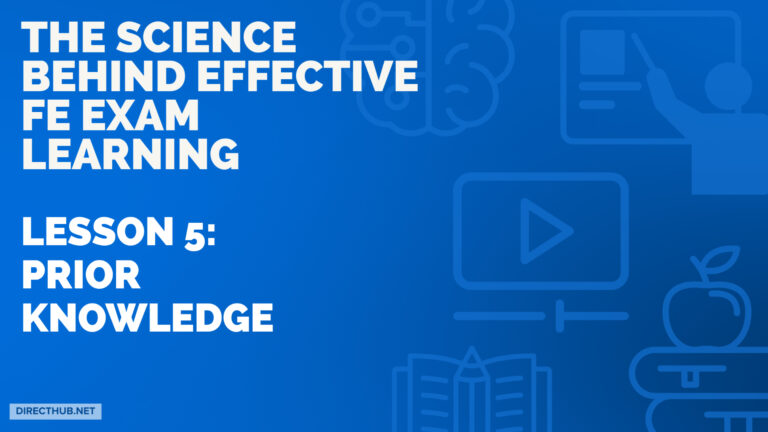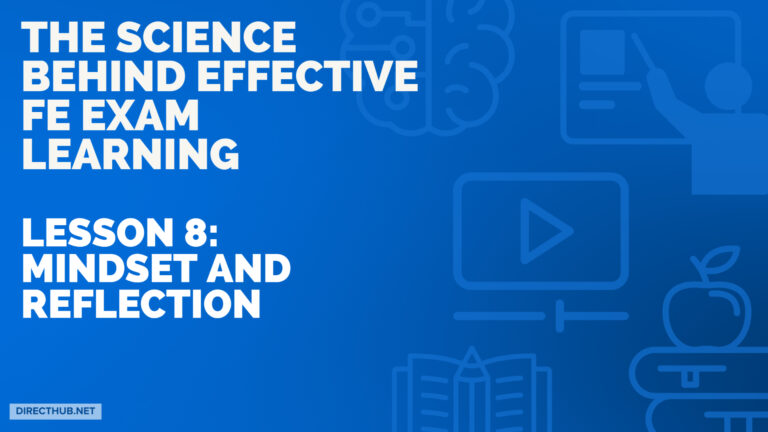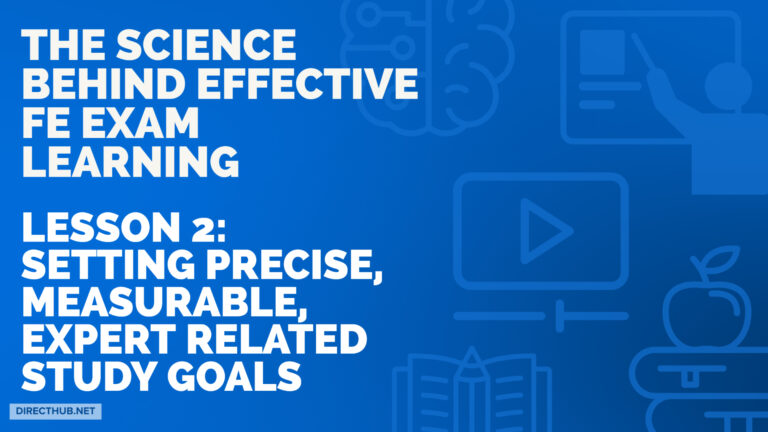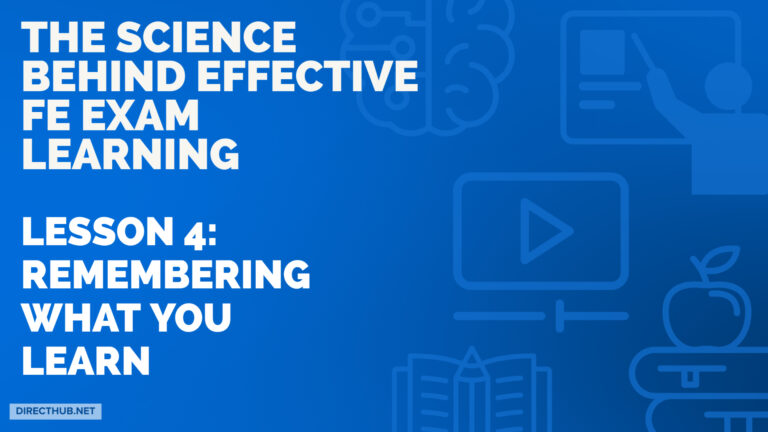Lesson 3: FE Exam Cognitive Load
So far we have defined expert practices and created effective learning goals that are precise, measurable, and relate back to expert linked skills. If you missed these lessons, you can read it here.
Today we will discuss one of the most important ideas that underlies all effective FE exam learning strategies—the idea of cognitive load.
Cognitive Load
Cognitive load refers to the total amount of information your working memory can handle. Your working memory can only hold 5 to 9 bits of information at once. Therefore, it will be very limited. When your brain is overloaded by too much unnecessary stimulation, your working memory is “working” at max capacity. Leaving you with no extra room to retain any new relevant information – a point of very high cognitive load.
Let’s say you’re asked to solve problem 2 + 2 or 3 + 5. This imposes a very low cognitive load. But now let’s say you’re asked to prove the Bernoulli Theorem – very high cognitive load. More examples: calculating the slope of a line – low cognitive load. Solving for the angle of rotation to the maximum and minimum principal stress plane using Mohr’s Circle – high cognitive load.
When cognitive load is too high, you will very likely make more mistakes. You won’t remember what you were reading, hearing, or watching. Your brain is working too hard trying to make sense of everything you’re asking of it. You’ve reached a point where your attention is limited – as a result, your learning suffers.
So should you always avoid high cognitive load? No, you want to have the “right” type of high cognitive load that’s linked to learning the relevant problem-solving skills.
Ideally, having the right amount of cognitive load that’s neither too low or too high will result in an efficient learning experience. If cognitive load is too low, your brain won’t be actively engaged in a way it could be. If cognitive load is too high, your brain is overloaded to the point where you can’t keep what you’re learning straight. This does not mean you won’t learn anything; it just means you are likely to retain so little of the information.
An ideal state strikes the sweet spot between challenging but not overwhelming.
Good Load and Bad Load
Some high load is needed to learn. If you want to become good at solving Derivative and Integration problems, solving these problems will impose a high yet necessary load. Other load not related to learning the expert skills needed to solve these types of problems is unnecessary and costly. What’s this other load? It’s those words you don’t understand, the extra jargon, distracting graphs, phone notifications, beeping on your phone – all of these will eat away your attention, ultimately making your learning less efficient.
Simply put: Good load is directly related to what you’re trying to learn. Bad load is not related to what you’re trying to learn.
For example, an FE exam course that has you watch a 2-hour lecture while you’re doing your best to take notes and watch PowerPoint slides is asking you to spend your cognitive effort on watching. You’re spending a huge amount of your time watching a professor talk through PowerPoint slides. But watching a professor talk about solving FE problems or even reading off concepts presented on the slides is not a vital skill for becoming prepared to pass your FE exam.
In addition, almost always, a student will try to take verbatim notes during a lecture. They may have taken thorough notes, but their brain was almost entirely focused on copying down what the professor is saying, not on understanding the material.
What should you be doing instead?
Remember that previous lesson where we introduced the idea of expert-related skills? For an exam like FE, your load is better applied by using a course or resources that hone in on learning and practicing these expert-related skills. This includes:
- learning unit conversions
- learning how to recognize different problem statements
- learning the step-by-step approach to solving FE type problems
- solving problems by always applying the FE Handbook
- applying your calculator to save exam time
- solving curve ball FE conceptual questions
- solving timed FE like questions
Any time you find yourself doing an activity or paying attention to something not related to these skills you’re trying to acquire; your learning experience could be more efficient.
What are some ways to reduce cognitive load?
As you’re preparing for your FE exam, you will likely find yourself in a situation where you’re under high cognitive load. Usually, this is normal if you’re learning a difficult concept. But anytime you get into a state of using a high cognitive load for too long – TAKE A BREAK. You’ll know when you’ve reached this point since this is when you begin to make silly mistakes, get easily flustered, and get easily distracted. Your break should be simple with minimal stimulation. You’re trying to reduce your cognitive load so you can get back to studying with a fresh perspective.
But sometimes the material you’re using isn’t designed to optimally reduce cognitive load.
The FE prep book you’re using may be too dense. It may have you solve questions that go overboard when it comes to the FE exam. The lectures may be poorly organized. The solutions to the problems may skip too many steps. The course interface has too many distracting elements. The teacher talks about irrelevant concepts not related to the FE exam. The list goes on…..
Make sure you are using a course or a book designed to reduce your cognitive load in several ways. Organized lectures, questions that walk you through step-by-step solutions, a teacher that breaks things down in a way you understand, a teacher that keeps you engaged, simplified diagrams, and the use of less jargon, especially when it’s not related to learning what you need to know to pass your FE exam.
These things work because they reduce unnecessary load on you.
How can this help with your FE exam preparation?
Your First Task
The first task you should be working on in reducing unnecessary cognitive load is to REMOVE ALL DISTRACTIONS. When you sit down to study and learn, set a timer, put your phone on silent, put your phone in a different room, do not take phone calls, play videos, or check social media.
Your Second Task
The second task can be challenging. From your course or prep material, you will need to learn to recognize certain aspects of the course or prep material that unnecessarily load your brain. Even small things can impose load. Imagine the solution below for a static friction problem. Which solution imposes less cognitive load?
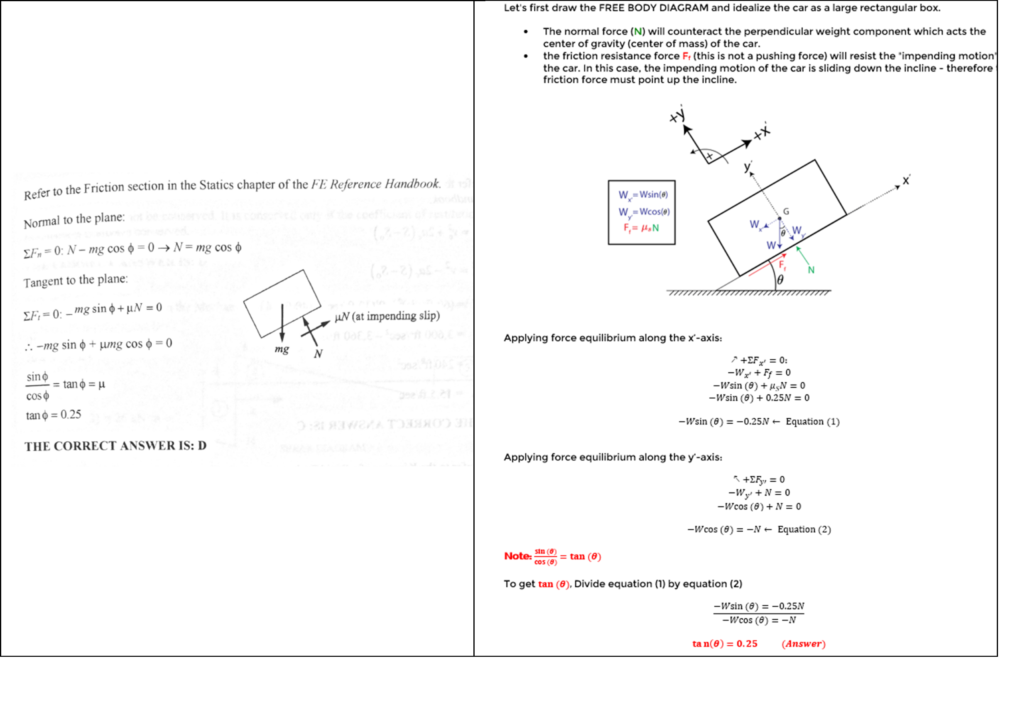
You may think the solution on the left is better because it’s a lot shorter and simpler. But if you make the effort to analyze both solutions, you will come to realize the solution on the left is leaving a lot of things unsaid. Why is there a diagram with a box? Why is the frictional force point up the incline? What does “normal” or “tangent” to plane mean? ALL OF THESE are unexplained steps likely to increase your cognitive load as you try to scramble your way around the solution.
The solution on the right does the opposite. The box diagram is defined as the “free body diagram”. The x’ and y’ coordinate systems are clearly denoted. The weight force is broken down into components. The reason why the frictional force points up the incline is explained. And lastly, each step taken is clearly presented. As you try to make sense of this solution, your cognitive load isn’t too high because you’re not having to think too much about why a certain step was taken.
The solution on the right clearly lays out the steps. It makes it easier for you to focus on the vital skill of learning the step-by-step process you can apply to solve static friction problems.
Your Third Task
The third task is to recognize when you are overloaded. Are you easily forget what you have just read, watched, or heard? You can try to apply the techniques that good teachers use to reduce load. Can you re-organize the information in your own way? Can you solve a problem in your own way after looking at the expert worked example? Or simplify a diagram so that it makes sense to you?
Now you should have a better understanding of how cognitive load works. Take a moment to analyze your current studying approach through the lens of cognitive load.
In the next lesson, lesson #4, we will discuss strategies that can help us remember things!

